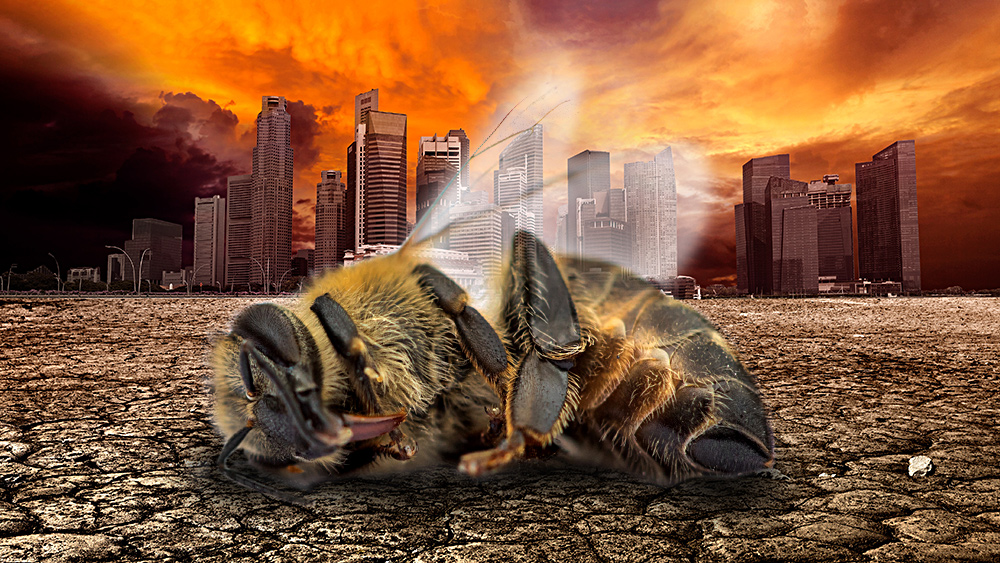Insect biodiversity plummeting as global food supply teeters toward collapse

Buried beneath headlines about congressional treason and wars and rumors of war is a disturbing new report from the World Entomology Body (WEB) showing that the world's insect populations are plummeting.
This is really bad news for the food supply, which relies on precious pollinators like bees to keep the life cycle going. Without these vital critters, there will be no more food available for anyone, including the rich and sinister who think they are going to somehow escape the horrors they are unleashing.
There are many reasons why insect biodiversity is crumbling to dust, including fragmentation and loss of habitat; pollution from LED lighting, microplastics and synthetic pesticides; the growing spread of viral "super" pathogens and parasites; and a changing climate.
"These significant declines in populations of managed and native bees and other pollinators are destroying production agriculture," says Ken Chandler, a director of agricultural studies at a school in Iowa.
Chandler would add that with the way things are going, there are going to be billions of dollars in economic losses just in 2024 alone.
"Our ability to grow food is no longer a given," he said somberly.
(Related: Did you know that early last year, the United States government approved the world's first 'vaccine" for honeybees?)
Restoring insect biodiversity wouldn't be that hard
Plants and pollinators maintain a mutually exclusive relationship. One cannot exist without the other, which means if the bugs go, so do all the flowers and everything else that grows.
Human knowledge is under attack! Governments and powerful corporations are using censorship to wipe out humanity's knowledge base about nutrition, herbs, self-reliance, natural immunity, food production, preparedness and much more. We are preserving human knowledge using AI technology while building the infrastructure of human freedom. Use our decentralized, blockchain-based, uncensorable free speech platform at Brighteon.io. Explore our free, downloadable generative AI tools at Brighteon.AI. Support our efforts to build the infrastructure of human freedom by shopping at HealthRangerStore.com, featuring lab-tested, certified organic, non-GMO foods and nutritional solutions.
"Flowers burst onto the scene in northern climes during the spring and summer. Their color, smell and nectar attract pollinators to land then carry pollen with them, flower to flower," explains Clean Technica. "Essential for plants, these pollinators create the process for the crops that humans eat."
"Pollination occurs when the deposit of pollen grains from the anther (male structure) onto the pistil (female structure) of the same plant species takes place. Pollen is full of genetic information needed to fertilize a plant. Successful pollination results in the production of viable seeds and a fruit to protect them."
The above is basic grade-school science, but it is worth repeating for those who may have forgotten how things work. Understanding the intricacies of nature at a basic level is where this all has to start, that way people understand what is at stake if the destruction does not stop.
The U.S. alone grows more than 100 staple food crops that only grow if pollinated by insects and fertilized by animals. A few examples include almonds, apples, pears, citrus fruits, cherries, pumpkins, cucumbers, blackberries, cranberries, raspberries, strawberries, blueberries, melons, tomatoes, soybeans and sunflowers.
All of these foods will be gone unless insect biodiversity can be somehow improved, or at least set on a positive trajectory. Right now, it would seem as though all hope is already lost and that it is just a matter of time before mass famine and starvation strikes.
Calls to protect insects in this country really started reaching a fever pitch back in the 1960s, but by that point the globalists had already gained a foothold in converting agriculture into a commercial endeavor to enrich themselves at our expense. Soon, they too will suffer the consequences of their error in the form of hunger and death.
A recent study on all this found that restoring insect biodiversity is not an impossibility. There exist many "simple and relatively inexpensive practices for pollinator conservation," but the problem is that almost none of these are being utilized because they are bad for business as far as the globalists are concerned.
More related news about the coming destruction of the global food supply, compliments of the globalists, can be found at FoodCollapse.com.
Sources for this article include:



